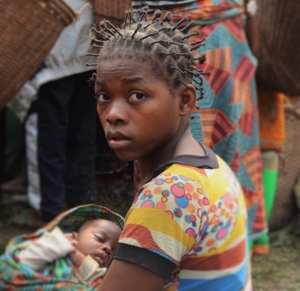Combating Child Marriage in the Democratic Republic of the Congo
 The Democratic Republic of the Congo (DRC) is ranked 19th globally for the percentage of girls who are married before they reach their 18th birthday (37%). A 2017 UNICEF study with this data also showed the DRC ranking ninth highest for the absolute number of child brides, at 1.3 million. These figures tell a story beyond girls marrying young — a narrative of recursive poverty and lack of education. But child marriage in the Democratic Republic of the Congo can be beaten. In fact, new programs for female education and community engagement are emerging every day to address this issue.
The Democratic Republic of the Congo (DRC) is ranked 19th globally for the percentage of girls who are married before they reach their 18th birthday (37%). A 2017 UNICEF study with this data also showed the DRC ranking ninth highest for the absolute number of child brides, at 1.3 million. These figures tell a story beyond girls marrying young — a narrative of recursive poverty and lack of education. But child marriage in the Democratic Republic of the Congo can be beaten. In fact, new programs for female education and community engagement are emerging every day to address this issue.
Identifying the Roots of Child Marriage
There are four main drivers of child marriage in the Democratic Republic of the Congo: poverty, armed conflict, adolescent pregnancy and cultural traditions.
- Poverty: As of 2018, 72% of the population of the DRC lived in extreme poverty. The practice of child marriage is a key indicator of poverty in a community. When a family gives a daughter away in marriage, they lower their own expenses. They no longer have to feed, clothe or educate the daughter. In addition, the promise of bride price is a motivating factor behind child marriage in the DRC. Bride price is an old tradition practiced in different areas across Africa. Unlike dowry, bride price entails exchanging money or valuable items from the groom’s family to the bride’s family as a record of their marriage. Historically, bride price helped tie two families together and strengthen the community as a whole. Today, it acts more as legal proof of marriage, used to determine the lineage of children or to secure inheritance. Families perceive the promise of wealth as an incentive for early marriage. For girls, however, the chance of receiving an education after early marriage is slim. As a result, girls who marry before the age of 18 in the DRC are less able to earn an income and to lift themselves, and their families, out of poverty.
- Armed conflict: According to a study done by the U.N., around 200,000 girls and women have experienced sexual violence in the DRC since 1998. Ongoing military conflicts in the eastern DRC, Rwanda and Uganda are part of the cause of this high number. The continued prevalence of armed conflict has led to some young girls being forced to marry perpetrators of sexual violence.
- Adolescent Pregnancy: Sexual health and education are not widely practiced in DRC, which leads to a lack of contraception and family planning. Early pregnancies can sometimes result in child marriage, as families hope to secure stability for later life. The cultural expectation that women will marry and become mothers leads to low contraception use, which can also contribute to adolescent pregnancies.
- Cultural Traditions: Underlying all these drivers of child marriage in the DRC, is the cultural belief that girls are inferior to boys. As a result of internalized gender inequality, the global prevalence of child marriage among boys is one-sixth of that among girls. Accordingly, programs designed to oppose child marriage typically emphasize female empowerment and education. One such organization, Debout Fille, was established in 2005 to “defend and protect the rights of girls in the Democratic Republic of Congo.”
Empowering Girls
Debout Fille operates across DRC in many rural and urban communities. The organization is working toward “eliminating violence and harmful practices and achieving universal access to education and sexual and reproductive health.” In South Kivu, a region heavily affected by the conflict between Ugandan and Rwandan rebels, Debout Fille is partnering with Women’s WorldWide Web (W4) to fight the cycle of child marriage. Through new “Digital Learning Clubs and Spaces,” girls and young women are learning about reproductive and sexual health. These clubs help girls establish “Girls’ Parliaments,” through which they can engage in community decision-making and political advocacy to oppose child marriage. “Parents’ Schools” are also working to engage and educate parents. Debout Fille is currently training 1,200 girls and local community members.
About 37% of girls in the DRC marry before reaching their 18th birthday. Poverty, armed conflict, adolescent pregnancy and cultural traditions can all be causes of child marriage. Organizations like Debout Fille are working to decrease child marriage through things like sexual and reproductive health education. While this is just one solution, it is an important step toward using education to end child marriage in the Democratic Republic of the Congo.
– Elizabeth Price
Photo: Pixabay
